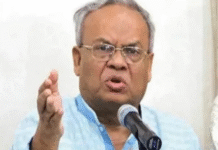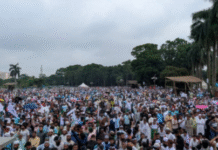By Dr Sharif As-Saber

The Backdrop
Bangladesh is fuming, protesting the recent High Court decision that ruled to re-introduce the civil service recruitment quota for freedom fighters’ children and grandchildren. Provision for reservation of quota is bound to deprive many to enter the Bangladesh civil service, a coveted career in the country, through merit.
A protest of this scale against a high court decision is unprecedented and has never been seen before, which calls for an immediate review and scrutiny of the High Court ruling. This is needed urgently to resolve the evolving unrest which has already witnessed several violent and bloodies protests all over the country including deaths.
The Ruling also reminds me of a sweltering statement made by the former Speaker of the parliament of Bangladesh, Abdul Hamid where he said, ‘people would resist if a government turned autocratic. Likewise, they would protest if a parliament enacted law against their interests; and they would stand against a court if it delivered verdicts against them’ (The Daily Star, 6 June 2012).
Past No-Quota Decision
Nonetheless, based on a prime ministerial declaration in 2018, a decision was made to remove all quotas in public service recruitment in Bangladesh. In an article published in the Daily Star, I wrote on the merit of that declaration and elaborated on its background and ongoing controversies surrounding the quota system (The Daily Star, 14 April 2018). At that time, I applauded the decision taken by the Prime Minister, which indeed was the right decision and as a result, was welcomed by people from all walks of life. The Prime Minister’s no-quota decision also managed to quell the nationwide protests that demanded the abolition of the existing quota system, then.
Subsequently, the government abolished quotas for recruiting civil servants belonging to the 9th to 13th grades (first and second-class jobs). However, this decision was invalidated by a recent ruling by a High Court bench consisting of Justice KM Kamrul Kader and Justice Khizir Hayat, which declared the government decision of scrapping the 30 percent civil service quota for freedom fighters’ children and grandchildren ‘illegal’ (The Daily Star, 5 June 2024). This verdict, once again, created countrywide angst and protests. The Appellate Division of the Supreme Court has already refused the appeal lodged by the Attorney General to stay the said High Court verdict creating a deadlock in the country’s recruitment process.
Quota System – A Chequered History
The civil service quota system in Bangladesh has had a chequered history. It was introduced in 1972 through an interim recruitment policy issued and implemented by an administrative order. This positive discrimination policy in the form of quotas was adopted as an interim measure to address historical injustices and systemic inequalities based on gender, regional differences, ethnicity, and disabilities. In addition, 30 per cent of posts were reserved for freedom fighters and the latter was done to recognize, and reward the freedom fighters for their services, sacrifices and dedication during the liberation war. The primary objectives were to rehabilitate freedom fighters and war-affected women as well as to facilitate a fair distribution of employment opportunities across genders, ethnicities, and the various geographic regions of the country. It is important to note that once implemented as a policy, quotas automatically became mandatory whereas, it would have been more appropriate to treat the quota system as a time-bound or transitory, target-based and measurable, and more importantly, an outcome-based policy initiative.
Justifiably, the 1972 policy was an ‘interim’ one which was to be in force spanning over a short period of time. In 1977, most of the Pay and Service Commission members opposed the quota system in public service and proposed to abolish it in 1997 (Prothom Alo, 10 June 2024). It was, however, not only extended, even it was further stretched to include the children and grandchildren of the freedom fighters. This decision was a blow to a healthy and consistent merit-based recruitment system.
Nonetheless, as a proactive approach, while positive anti-discrimination initiatives were adopted as policy tools to address historical injustices and systemic inequalities, special quota was introduced to show our gratitude to our valiant freedom fighters which was necessary and appropriate. However, extending the same to their children and grandchildren not only contradicts the constitutional provision of non-discrimination, allocation of the 30% quota appears to be way too high. Although the actual number of freedom fighters is still a question mark, the total percentage of freedom fighters against the current population is about 0.1%. Allowing a 30% quota to their children and grandchildren is, by no means, proportional and justifiable. There is no instance globally to provide accolades or special privileges to the descendants of freedom fighters to such an extravagant and reckless extent. It was unrealistic and unjustified.
The Pro-Quota High Court Ruling, the Constitution, and Emerging Concerns
Accordingly, questions are now being raised by many including the Attorney General AM Amin Uddin about the rationale of the decision made by the High Court on a policy-related matter such as this. The attorney general argued that abolishing the quota system was an administrative matter and the High Court should not have interfered with a policy decision such as this. On the other hand, the chief justice wanted to know from the attorney general why there was a public agitation or movement against the verdict. He also questioned whether it was appropriate for some quarters to push for changing the High Court decision by waging a movement (RTV news, 4 July 2024). Supporting and standing by the Chief Justice, Prime Minister Sheikh Hasina has termed the no-quota movement as inappropriate and sub judice (Prothom Alo, 7 July 2024).
As per the constitution, the judiciary plays its role and exercises its power as and when necessary and applicable. According to Article 102 of the Constitution of Bangladesh, the High Court Division has the power to issue certain orders and directions in connection with the affairs of the Republic to enforce any of the fundamental rights conferred by Part III of the Constitution, which includes equality before law and guaranteeing non-discrimination. The constitution also iterates, ‘the State shall not discriminate against any citizen on ground only of religion, race, caste, sex, or place of birth (Article 28). This article does not seem to be supportive of a quota system affecting meritocracy and compromising greater good for the nation.
However, the constitution also gives the state the right for “making special provision in favour of any backward section of citizens for the purpose of securing their adequate representation in the service of the republic” as and when necessary (Article 29). That means, there is no point in supporting a complete absence of quota since there is a reason why “positive discrimination” is common around the world. Having said that, it should not undermine or outweigh the merit-based recruitment process. It does not make sense to reserve 56% quota for all public service recruitments and thus this must be stopped to ensure quality, integrity, and fairness in the public service recruitment process.
However, the way to bring parity in terms of imbalances in recruitment in public service does not need to be through the provision of the quota or affirmative action but through capacity building of the deprived community using social security measures and targeted provisioning of education and training.
The Way Forward
In a nutshell, it would be sad and pejorative to see any loss of lives and property, along with any unnecessary loss of faith in government institutions due to any court ruling not supportive of the people’s genuine and lawful demands and aspirations. In this regard, public queries and concerns revolve around questions such as, why do we need a government for, and what should be the functions and responsibilities of each of its branches (legislative, judiciary and executive)? The question may extend further to understand the rule of law and the misrule of law. People are also looking for some sort of explanation in relation to the nature of the verdict made on the quota system. They would like to know whether the spirit of the law was followed to protect the citizens’ rights and uphold valid, citizen-centric decisions made by the state. In the given circumstances, these questions require immediate and comprehensive attention and response from all branches of the government. It is important to note here, the constitution does not provide unfettered power and authority to any one of the three organs of the state. A balanced and concerted efforts are, therefore, needed.
From this very context, statement by the former Speaker of the parliament is important to understand. Although the Court contested his statement, it was a landmark testimony reflecting on the spirit of law, democracy, and governance. In his statement, he also recommended regular and constructive interactions and dialogues among the three organs of the government. His statement also provides some answers to questions raised in public by the public, which in turn, could help resolve the issue and quell the current anti-quota movement in the country. It is time now for all concerned to closely scrutinize the matter before coming to a sensible resolution based on common sense, public demand, equity, and justice.

Dr Sharif As-Saber is a member of the Professoriate at Sultan Qaboos University, Oman; President of the Melbourne-based thinktank. Governance, Administration, and Innovation Network; and Vice President of the United Nations Principles of Responsible Management Education Network (PRME), Middle East Chapter.









